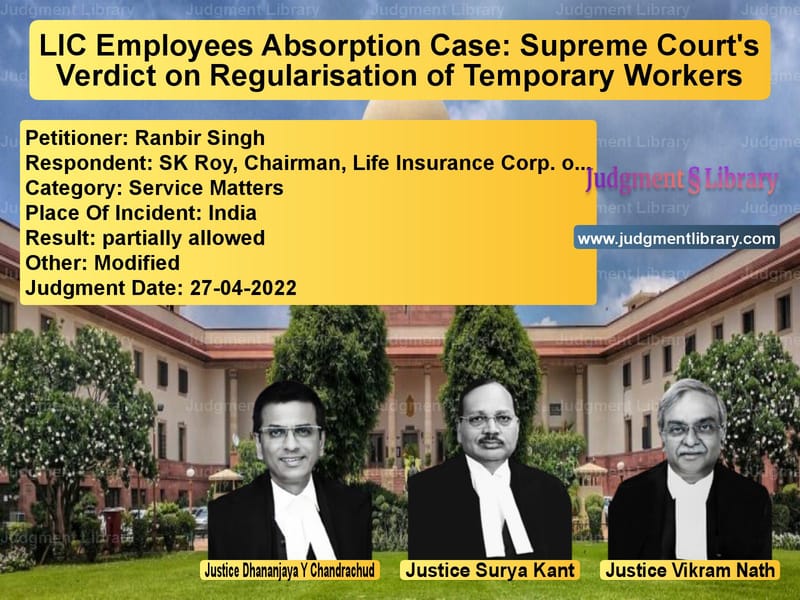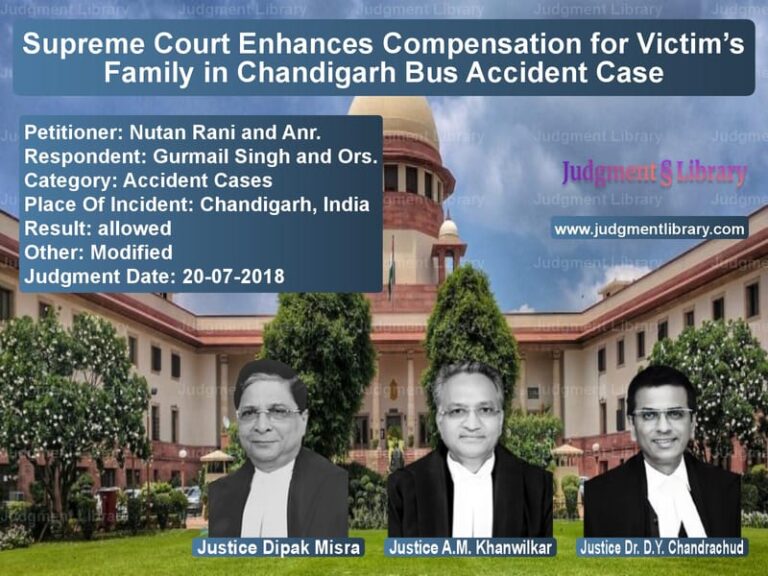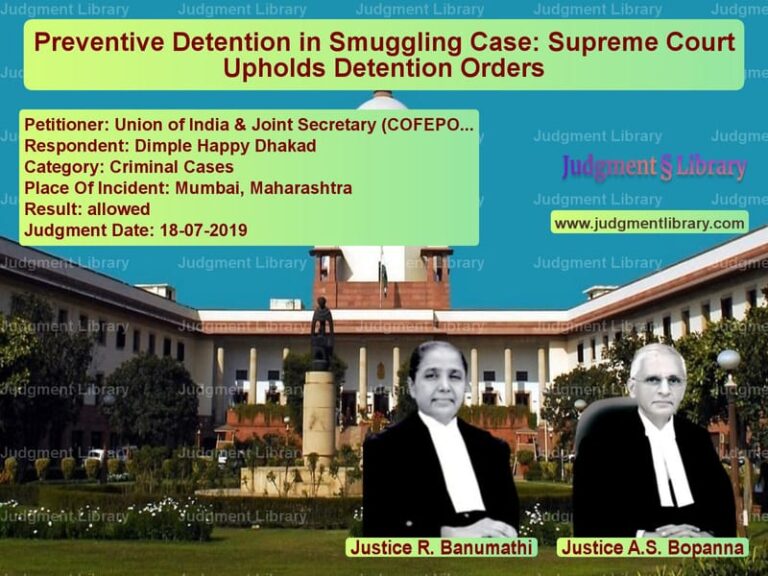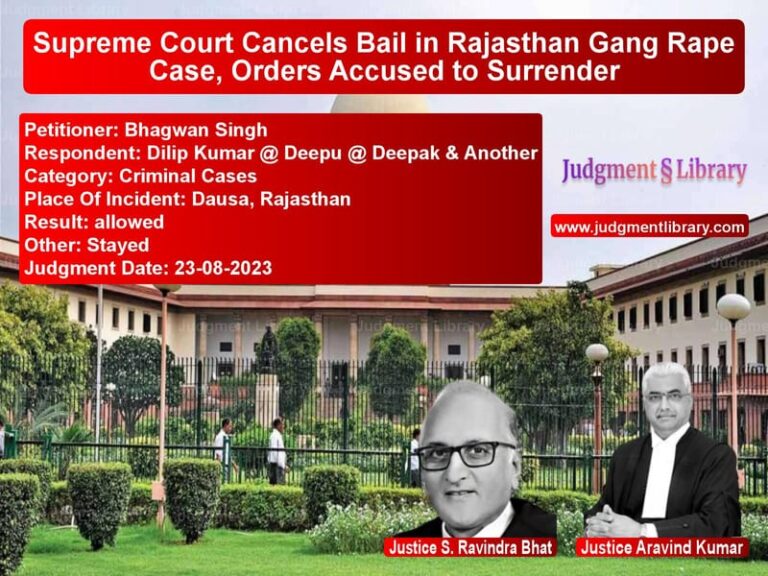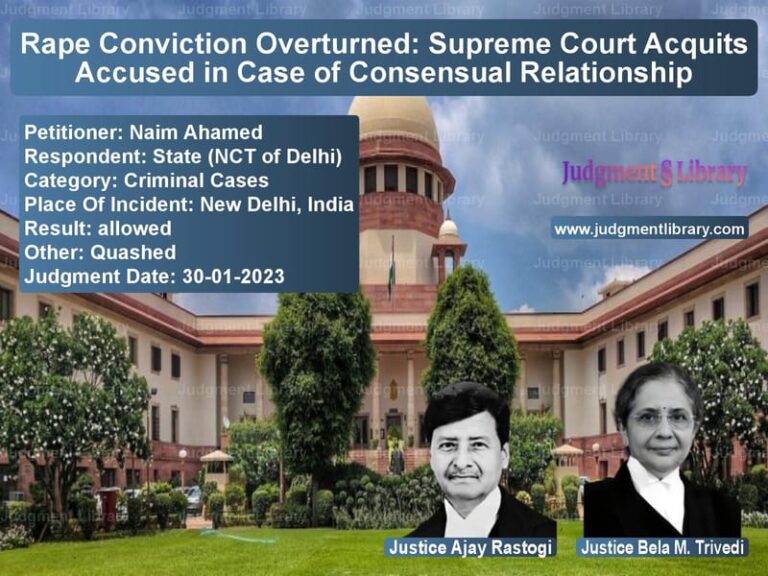LIC Employees Absorption Case: Supreme Court’s Verdict on Regularisation of Temporary Workers
The Supreme Court of India recently ruled on the long-standing employment dispute involving temporary, badli, and part-time employees of the Life Insurance Corporation of India (LIC). The case, Ranbir Singh vs. SK Roy, Chairman, Life Insurance Corporation of India & Anr., dealt with claims for regularisation, the applicability of industrial dispute settlements, and the rights of temporary employees under service jurisprudence. The judgment provided clarity on the absorption process of these employees and the extent to which previous legal pronouncements influenced their status.
The dispute arose from the demand for permanent absorption of employees who had served in temporary roles within LIC, often for extended periods. The core legal questions involved the impact of judicial precedents, the role of industrial tribunal awards, and the legitimacy of retrospective absorption claims.
Background of the Case
The petitioners in this case were temporary and badli employees who had worked for LIC in various capacities. Many had been engaged on short-term contracts, while others were employed intermittently for several years without being granted permanent status. These employees claimed that they were entitled to regularisation under past industrial tribunal awards and Supreme Court rulings.
LIC, however, contended that these workers were engaged as per the corporation’s operational requirements and that automatic absorption into permanent service was neither legally warranted nor feasible. The corporation relied on various legal precedents to argue that regularisation cannot be granted unless recruitment follows prescribed selection procedures.
Petitioners’ Arguments
The petitioners, represented by legal counsel, argued that:
- They had worked for prolonged periods in temporary roles, often for several years, without being granted permanent status.
- Past industrial tribunal awards had recognized the right of such employees to be absorbed into regular service.
- The Supreme Court, in previous cases, had ruled in favor of similarly placed employees, setting a precedent for their absorption.
- LIC’s refusal to regularise them violated principles of fairness and non-discrimination under Article 14 of the Constitution.
- Their continued employment on a temporary basis was exploitative and went against the principles of social justice.
Respondents’ Arguments
LIC, represented by its legal team, countered the claims with the following arguments:
- The appointments were made on a need-based basis, with no guarantee of permanency.
- Industrial tribunal awards did not provide an unconditional right to absorption but were subject to LIC’s operational requirements.
- The Supreme Court had previously ruled that regularisation cannot be granted in violation of recruitment rules and established procedures.
- The financial and administrative burden of absorbing all temporary employees into permanent service would be unsustainable.
- The employees had been compensated as per their contractual terms and had no vested right to seek regularisation.
Supreme Court’s Judgment
The Supreme Court bench, comprising Justices Dhananjaya Y Chandrachud, Surya Kant, and Vikram Nath, delivered a nuanced ruling that balanced the interests of employees with the corporation’s administrative constraints. The key observations made by the Court were:
- Legitimacy of Industrial Tribunal Awards: The Court examined past awards and found that while they recognized the need for fairness in employment practices, they did not grant an automatic right to absorption.
- Applicability of Past Precedents: The Court reaffirmed that previous Supreme Court judgments on similar matters had held that regularisation must conform to statutory recruitment rules.
- Fairness and Reasonableness: The Court ruled that employees who had served continuously for extended periods should be given preference when filling permanent vacancies.
- Recruitment Procedures: The judgment underscored that all recruitments must adhere to LIC’s prescribed procedures, including merit-based selection.
- Financial Implications: The Court acknowledged LIC’s argument that mass regularisation without due process would impose an unsustainable financial burden.
Key Directives Issued by the Court
Based on these findings, the Supreme Court issued the following directives:
- LIC must frame a transparent policy to give preference to eligible temporary employees when filling regular vacancies.
- Employees who had served for a specified number of years should be allowed to compete for regular positions without age restrictions.
- LIC should establish a mechanism to review the cases of long-serving temporary employees on an individual basis.
- Future engagements of temporary employees should be made with clear terms regarding tenure and renewal conditions.
Implications of the Judgment
The ruling has significant implications for employment law and public sector human resource management:
- Ensuring Fair Employment Practices: The judgment reinforces the need for fairness in engaging temporary workers.
- Clarity on Regularisation: The ruling sets clear parameters for when and how temporary employees can seek regularisation.
- Impact on Public Sector Policies: The decision influences how government bodies and public sector units engage contract employees.
- Strengthening Workforce Planning: LIC and similar institutions must now implement structured workforce planning to avoid legal disputes.
Conclusion
The Supreme Court’s verdict in Ranbir Singh vs. SK Roy, Chairman, Life Insurance Corporation of India & Anr. is a landmark ruling that clarifies the legal position on regularisation of temporary employees in public sector undertakings. The judgment ensures that employment decisions are based on merit and fairness while preventing the arbitrary denial of regularisation to deserving employees. By balancing administrative constraints with employee rights, the ruling sets a strong precedent for future employment-related disputes in India.
Petitioner Name: Ranbir Singh.Respondent Name: SK Roy, Chairman, Life Insurance Corp. of India & Anr..Judgment By: Justice Dhananjaya Y Chandrachud, Justice Surya Kant, Justice Vikram Nath.Place Of Incident: India.Judgment Date: 27-04-2022.
Don’t miss out on the full details! Download the complete judgment in PDF format below and gain valuable insights instantly!
Download Judgment: ranbir-singh-vs-sk-roy,-chairman,-li-supreme-court-of-india-judgment-dated-27-04-2022.pdf
Directly Download Judgment: Directly download this Judgment
See all petitions in Employment Disputes
See all petitions in Public Sector Employees
See all petitions in Recruitment Policies
See all petitions in Judgment by Dhananjaya Y Chandrachud
See all petitions in Judgment by Surya Kant
See all petitions in Judgment by Vikram Nath
See all petitions in partially allowed
See all petitions in Modified
See all petitions in supreme court of India judgments April 2022
See all petitions in 2022 judgments
See all posts in Service Matters Category
See all allowed petitions in Service Matters Category
See all Dismissed petitions in Service Matters Category
See all partially allowed petitions in Service Matters Category

